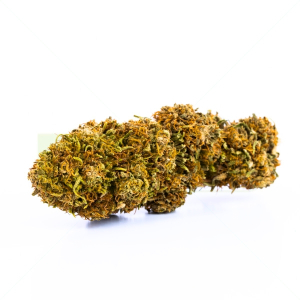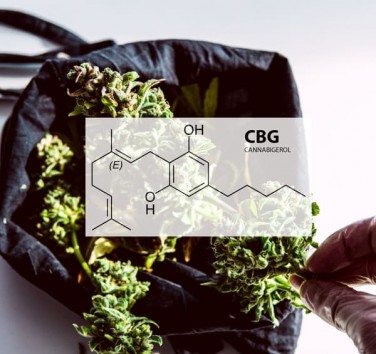Sommaire
- What is cannabigerol (CBG)?
- How does CBG work on the body?
- The potential therapeutic effects of CBG
- CBG: Is it legal in France?
- The differences between CBG and CBD
- What to choose between CBG and CBD?
- How to choose CBG?
- The future of CBG and its potential implications in modern medicine
- The alliance of CBD and CBG: A beneficial synergy
What is cannabigerol (CBG)?
Discovered in the 1960s by cannabis research pioneers Yechiel Gaoni and Raphael Mechoulam, cannabigerol (CBG) is one of the compounds present in cannabis. It is found in psychoactive and non-psychoactive hemp plants. Just like CBD, CBG is non-psychoactive. Unlike tetrahydrocannabinol or THC, it therefore does not produce any psychotropic effects of modifying consciousness.
So far, it looks a lot like CBD, except that CBG has one significant difference: it is a parent molecule. This means that its presence is very important for the biosynthesis of all other cannabinoids present in cannabis, such as THC or CBD. CBG is essentially the base that all other cannabinoids depend on and initiates the plant's growth process by converting the other components.
Due to this process, cannabis strains generally contain very little CBG, usually below 1% in quantity. Specialty breeders have begun experimenting with genetic manipulation and crossbreeding in order to obtain higher yields of CBG in cannabis.
In the world of cannabis-derived products, CBG is attracting a lot of interest and for good reason. Its unique position among other components promises great therapeutic interest that can surpass CBD and offer an alternative to THC which is legally prohibited. This powerful concentrate could revolutionize the entire consumption of cannabis products and even science. Studies on this mystery component continue encouragingly.
_1.jpeg)
How does CBG work on the body?
CBG offers therapeutic benefits considered remarkable for the body. Indeed, CBG appears to have the potential to reach higher ranks than other known cannabinoids, especially when it comes to medicinal applications. Fundamentally different from its peers due to its chemical structure, CBG offers effects different from others, particularly in the action it produces in the body.
Studies on the subject show that CBG can play a role in many diseases. It has been proven to activate the CB1 and CB2 receptors of the endocannabinoid system (ECS) of the human body and therefore affects the central nervous system.
As noted in the2018 Spanish study , CBG has a powerful anti-inflammatory effect, antifungal and analgesic properties as well as antidepressant qualities. CBG may also play a role in the treatment of psoriasis and may counteract anxiety and muscle tension.
Unlike CBD, CBG is still little known and little studied by scientists. We are therefore at the beginning of discoveries concerning CBG. The more popular the product becomes within the community of consumers and patients wishing to treat themselves with CBG, the more studies will multiply.
The potential therapeutic effects of CBG
Here is an exhaustive list of the potential therapeutic benefits of CBG on the human body and different diseases.
CBG and inflammatory bowel disease (IBD)
According to a study published in 2013 at the University of Naples, CBG may help IBD with its anti-inflammatory abilities. The study determined that cannabigerol significantly reduced the presence of inflammatory markers in mice with IBD and alleviated colitis. These results are also promising for other inflammatory diseases.
CBG and urinary bladder problems
A team of Italian scientists developed a study in 2015 and discovered that CBG would reduce bladder contractions and help resolve possible problems related to the urinary system.
CBG and appetite
According to a 2016 study published by the University from Reading, CBG would increase the appetite. Rats in the study that ate CBG doubled their food intake by increasing the quantity of meals. CBG can therefore help overcome eating disorders and improve mental state in people suffering from anorexia.
CBG and the brain
According to a 2015 study< span>, CBG acts as an antioxidant in the brain, meaning it can protect the nervous system from injury. The study shows that cannabigerol functions as a highly active neuroprotective drug in mice. The cannabinoid in question therefore improves motor deficits and protects neurons from toxicity.
CBG and cancer
Thanks to its antioxidant and anti-inflammatory properties, cannabigerol can support the fight against cancer. A study presented in 2014 highlighted that CBG may be able to inhibit the growth of cancer cells. Administration of cannabigerol could prevent colorectal cancer. The study also shows that CBG may have anti-tumor abilities, meaning the cannabinoid could be used not only for treatment, but also to prevent cancer in the future.
CBG and glaucoma
According to studies , CBG improves fluid drainage from the eye and reduces intraocular pressure. Additionally, the cannabinoid acts as a vasodilator in an eye and improves blood circulation. This effect brings more blood to an eye, which is richer in oxygen, and it may be useful in treating other eye diseases.
.jpeg)
CBG: Is it legal in France?
Cannabigerol is currently legal in France and all countries in Europe. Indeed, European Union legislation defines that CBG products with THC values below 0.2% are legal and consumable.
The differences between CBG and CBD
CBG (cannabigerol) and CBD (cannabidiol) are two very different cannabinoids. Here are some of the main differences between CBG and CBD:
1. Concentration: CBG is generally present in lower concentrations than CBD in cannabis plants.
2. Effects: CBD oil is known for its calming and relaxing effects, while CBG is considered more stimulating and may offer potential benefits for the nervous system.
3. Therapeutic properties: CBD is studied for its anti-inflammatory, antioxidant, analgesic and anxiolytic properties, while CBG is studied for its neuroprotective, anti-inflammatory, anti -bacterial and anti-tumor.
4. Uses: CBD is often used to treat anxiety, pain, insomnia and other conditions, while CBG is often used to stimulate appetite, relieve pain, reduce inflammation and treat bacterial infections.
It is important to note that research into the effects and benefits of cannabinoids, including CBG and CBD, is still ongoing and results may vary depending on individuals and circumstances.
/span>
What to choose between CBG and CBD?
The choice between CBG and CBD depends on your specific needs. CBG is generally considered beneficial for gastrointestinal issues, pain and anxiety, while CBD is often used for pain management, anxiety, insomnia and other sleep disorders, as well as for the reduction of inflammation. It is important to speak with a healthcare professional before using any CBG or CBD product to determine which is best for your individual situation.
How to choose CBG?
The most popular cannabigerol products are CBG isolate, CBG oil and CBG crystals. Because cannabigerol offers more benefits, the majority of consumers purchase it to improve their health and psychological well-being. In your choice of CBG, it is important to favor unprocessed products such as broad spectrum or full spectrum products.
If you are interested in cannabis products, it is very likely that you are hearing more and more about CBG. Indeed, breeders continue to create strains with ever higher quantities of CBG and medicine is becoming more and more interested in the subject. To not miss any future information on the subject, subscribe to our newsletter 321CBD and receive updates regularly. To be continued…
The future of CBG and its potential implications in modern medicine
While medical cannabis research has long focused on CBD and THC, CBG is quickly emerging as a rising star due to its unique properties. It is important to understand where CBG fits in the current research landscape and what its potential implications are for the future of modern medicine.
The challenges of CBG research
Although CBG shows significant potential, the research is still in its early stages. The main reason for this is its low concentration in traditional cannabis strains, making it difficult to extract significant quantities for research. Fortunately, with the increase in interest in this cannabinoid, efforts are being made to develop high-CBG cannabis strains.
Increased therapeutic potential
A clear advantage of CBG over other cannabinoids is its versatility as a potential treatment for a variety of ailments. For example, preliminary studies suggest that CBG may be effective in treating certain neurodegenerative diseases due to its neuroprotective properties. Additionally, CBG's ability to stimulate appetite could make it valuable for treating conditions such as anorexia or the side effects of chemotherapy.
Collaboration between science and industry
As demand for CBG products increases, it is likely that we will see increasing collaboration between researchers and the cannabis industry. These collaborations could accelerate the bringing to market of innovative CBG-based treatments, thereby benefiting patients and consumers.
The alliance of CBD and CBG: A beneficial synergy
Over the years, much research has demonstrated that cannabinoids do not just work in isolation. When consumed together, they can potentially enhance each other's effects, creating what is known as the entourage effect. This interaction optimizes the benefits of cannabinoids on the body.
The entourage effect in detail
The entourage effect is not only the result of the combination of CBD and CBG. It refers to the harmonious interaction of all the cannabinoids present in cannabis, amplifying the therapeutic effects of each. This complementarity offers a much richer and potentially effective experience than taking a single cannabinoid.
Enjoy the combination of CBD and CBG
Instead of debating the respective merits of CBD and CBG, a holistic approach would be to combine the two. Whether in the form of blended oils or cannabis flowers specially grown to contain high levels of these two cannabinoids, there are many ways to benefit from their synergy.
It is crucial to note that quality is paramount. Opting for quality products ensures that you get the best possible effects and reduces the risks associated with consuming products that contain harmful impurities or additives.
Ultimately, not having to choose between CBD and CBG might be the best solution. By consuming them together, you could enjoy an enriched and more complete experience. As always, be sure to choose trusted products, like those offered on our 321CBD store.















